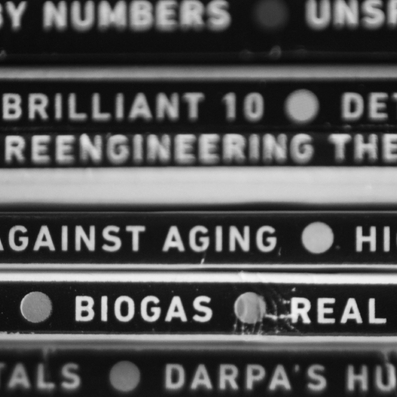
7 Steps to a Successful Ideation Session
Brainstorming, Brainwriting, Ideation, and the Structured Process of Idea Generation
Read MoreDoctors, lawyers, marketers, and financiers get singled out—negatively—for their jargon. But the truth is this: There isn’t any occupation or pastime that doesn’t have some specialized language associated with it.
“A total of 64 percent of American workers use jargon at least two to three times a week. In fact, 88 percent of respondents admit to pretending to understand office jargon—even when they really have no idea what it means.”
Office jargon is often unavoidable—and even necessary for a more efficient work process within a team. Often, a professional has been involved in a business for so long that they begin to forget what is jargon and what is not.
English teachers are the ones who most often decry the use of jargon, but you haven’t seen jargon until you’ve read a graduate English essay on the post-structuralist approach to textual analysis.
“Lingo helps get difficult jobs done quickly and precisely.”
A lot of people claim to hate jargon, but what they hate is other people’s jargon. They hate the jargon that they don’t have to use to navigate their daily lives.
There are two types of jargon: useful jargon that insiders are expected to know, such as anyone in the medical field. Then there is the jargon that’s purpose is mainly just to impress a superior, but ignorance of it is not necessarily a deal-breaker. Many professionals admit to feeling like jargon is a way to separate insiders from the outsiders.
Where jargon gets into trouble is when a person who uses one sort of jargon uses it on a person who has no fondness for that sort of jargon.
A doctor talking to a patient about a diagnosis probably should avoid using jargon as much as possible, but do we really want doctors who converse with each other in the operating room feeling pressured to use so-called plain English? Probably not.
“Almost every specialized field develops this sort of private language,” Jim Meigs wrote in Popular Mechanics. “When pilots talk to air traffic control or engineers confer over a CAD file, the acronyms and technical shorthand are usually too thick for civilians to follow. But this lingo helps get difficult jobs done quickly and precisely.”
Jargon can force us to pause, to ponder, to question.
Of course, it is important to have people in every field and endeavor who can explain complex concepts in plain English to the general public. Lyrical science writers, alas, have always been in the minority in the scientific community, as science writer Matthew Francis acknowledged on his blog. “There’s even some truth to the trope that most professional scientists are poor writers,” he wrote. “Academia doesn’t encourage clear writing, as a rule.”
However, eliminating jargon entirely would be counterproductive, Francis added. There are concepts, he wrote, that “you simply can’t describe if you can’t introduce at least some technical language.”
As children are learning to read, they are encouraged to look up words they don’t understand. This is how vocabularies, and brains, expand. Yet many contemporary adults seem to want everything explained to them.
Perhaps this is a byproduct of the speed at which information flies at us these days and the pressures we all face to grasp this unprecedented largesse as quickly as is feasible. It may be that many of us feel like we lack the time we had as children to research terms that are foreign to us. But the more so-called jargon we learn, the better we are able to communicate with the jargon users we encounter most frequently.
“Jargon can force us to pause, to ponder, to question,” Dartmouth College English professor Colleen Glenney Boggs wrote on the Huffington Post. “If you have ever studied a new subject, you know the pleasures of picking up its jargon, those moments when something that once was obscure becomes clear. That’s why I like more than just the jargon that’s specific to my profession: I enjoy stepping outside of my role as an expert and immersing myself as a student in a new subject.”
Then, too, jargon may earn its stripes to such an extent that it leaps into the common lexicon.
“In a workplace that’s fundamentally indifferent to your life and its meaning, office speak can help you figure out how you relate to your work—and how your work defines who you are.”


Funny I should mention the phrase “earn its stripes.” Much military jargon has entered everyday usage over the years.
In an article in the Telegraph, Jasper Copping wrote that blind spot, binge drink, snapshot, wash out, fed up, lousy, crummy, and pushing up daisies were once slang terms used exclusively by soldiers fighting in World War I.
And turn a blind eye, over a barrel, know the ropes, slush fund, the bitter end, first rate, and a clean slate all started out as nautical slang, according to a post on the Art of Manliness website.
Exploring the etymology of jargon can be fascinating. In a now-defunct radio series called Trade Lingo, NPR explored the roots of the specialized terms used in comedy writing, whale watching, knitting, and many other endeavors.
The bottom line came to us from Wall Street, wrote Emma Green in an Atlantic article that charted the history of office speak, and the world of marketing has given us run it up the flagpole, hard sell, and low-hanging fruit.
It is Green’s contention that corporate jargon first emerged in the ’50s and ’60s as an attempt by executives at ever-larger companies to understand their employees’ emotional needs as a path to maximizing productivity and profits. “What people were very much focused on,” Harvard Business School professor Rakesh Khurana told Green, “was ‘How can we get workers to feel differently about their jobs?’”
The terms organizational culture, corporate culture, synergy, and paradigm shift all came out of this period, Green wrote. Corporate jargon, therefore, has psychological and sociological roots, and, even today, much office jargon is essentially an attempt to understand people and the interplay of people better—whether they be customers, employees, or colleagues.
Steve Tobak of CBS News’ MoneyWatch wrote that business jargon helps companies “figure out what to focus on and what to leave alone.”
“If phrases like core competency and value proposition help teach executives how to run their companies more effectively,” he added, “then they're neither ‘silly’ nor ‘substitutes for thinking.’”
Exploring the etymology of jargon can be fascinating.
The irony of business jargon, wrote Green, is this: As much as everybody makes fun of it, “companies depend on it, and regular people willingly absorb it. As [UC Berkeley professor Geoffrey] Nunberg said, ‘You can get people to think it’s nonsense at the same time that you buy into it.’ In a workplace that’s fundamentally indifferent to your life and its meaning, office speak can help you figure out how you relate to your work—and how your work defines who you are.”
Professionals should encourage clients and customers of theirs to stop them and ask questions if they are unfamiliar with a term. And on the flip side, people should feel encouraged to speak up and inquire about topics or certain jargon that they may not have heard of. Life is a constant learning process. One can never learn too much, and we as humans should always feel encouraged to learn from one another and ask questions when something might not make sense. We can’t go through life pretending to know industry jargon and expect to learn along the way unless we accept what we do not know.

Brainstorming, Brainwriting, Ideation, and the Structured Process of Idea Generation
Read More
National Geographic’s Digital and Social Media Strategy
Read More